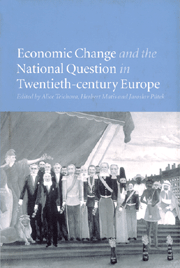Book contents
- Frontmatter
- Contents
- List of figures
- List of tables
- Notes on contributors
- Acknowledgements
- Introduction
- 1 Nationalism and the economic question in twentieth-century Ireland
- 2 Economic aspects of the nationality problem in nineteenth- and twentieth-century Belgium
- 3 The economy as a pushing or retarding force in the development of the German question during the second half of the twentieth century
- 4 Lusatian Sorbs in Germany before the Second World War: the influence of the economy on the national question
- 5 Unequal regional development in Switzerland: a question of nationality?
- 6 The Portuguese national question in the twentieth century: from Spanish threat to European bliss
- 7 From autarky to the European Union: nationalist economic policies in twentieth-century Spain
- 8 The economic background to the Basque question in Spain
- 9 Economic change and nationalism in Italy in the twentieth century
- 10 National integration and economic change in Greece during the twentieth century
- 11 National identity and economic conditions in twentieth-century Austria
- 12 Economic, social and political aspects of multinational interwar Czechoslovakia
- 13 Nationality and competition: Czechs and Germans in the economy of the First Czechoslovak Republic (1918–1938)
- 14 Economic aspects of Slovak national development in the twentieth century
- 15 Economic change and national minorities: Hungary in the twentieth century
- 16 Economic background to national conflicts in Yugoslavia
- 17 Economic differentiation and the national question in Poland in the twentieth century
- 18 Economy and ethnicity in the hands of the state: economic change and the national question in twentieth-century Estonia
- 19 Changing structure and organisation of foreign trade in Finland after Russian rule
- 20 Economic change and the national question in twentieth–century USSR/Russia: the enterprise level
- Index
5 - Unequal regional development in Switzerland: a question of nationality?
Published online by Cambridge University Press: 01 September 2009
- Frontmatter
- Contents
- List of figures
- List of tables
- Notes on contributors
- Acknowledgements
- Introduction
- 1 Nationalism and the economic question in twentieth-century Ireland
- 2 Economic aspects of the nationality problem in nineteenth- and twentieth-century Belgium
- 3 The economy as a pushing or retarding force in the development of the German question during the second half of the twentieth century
- 4 Lusatian Sorbs in Germany before the Second World War: the influence of the economy on the national question
- 5 Unequal regional development in Switzerland: a question of nationality?
- 6 The Portuguese national question in the twentieth century: from Spanish threat to European bliss
- 7 From autarky to the European Union: nationalist economic policies in twentieth-century Spain
- 8 The economic background to the Basque question in Spain
- 9 Economic change and nationalism in Italy in the twentieth century
- 10 National integration and economic change in Greece during the twentieth century
- 11 National identity and economic conditions in twentieth-century Austria
- 12 Economic, social and political aspects of multinational interwar Czechoslovakia
- 13 Nationality and competition: Czechs and Germans in the economy of the First Czechoslovak Republic (1918–1938)
- 14 Economic aspects of Slovak national development in the twentieth century
- 15 Economic change and national minorities: Hungary in the twentieth century
- 16 Economic background to national conflicts in Yugoslavia
- 17 Economic differentiation and the national question in Poland in the twentieth century
- 18 Economy and ethnicity in the hands of the state: economic change and the national question in twentieth-century Estonia
- 19 Changing structure and organisation of foreign trade in Finland after Russian rule
- 20 Economic change and the national question in twentieth–century USSR/Russia: the enterprise level
- Index
Summary
In summer 1996 the privately owned ‘national’ airline Swissair made it known that most of its intercontinental flights starting from Geneva were to be discontinued, and that instead there was a shuttle service to be established between the airports of Geneva–Cointrin and Zurich–Kloten. This measure provoked an enormous outcry in the French-speaking part of Switzerland (the ‘Romandie’). Such a concentration of the longdistance flights on the airport situated in the German-Swiss part of the country and lying, incidentally, no more than some 200 kilometres from Geneva, passed for one further proof that the French-Swiss minority was and continued to be dominated – or even colonised – by the German-Swiss majority.
In actual fact the great economic crisis setting in after 1990, hitting the French-speaking part of Switzerland rather harder than the rest of the country, only served to accentuate a latent uneasiness of quite a few years' standing. A first peak of tension had been reached on the occasion of the plebiscite of 2 December 1992, when the issue was whether or not Switzerland was to become a member of the EEA (European Economic Area). As a whole the Swiss rejected membership by a very slim majority (50.3 per cent of noes), while the French-speaking cantons quite distinctly voted in favour of membership, the portions of ayes lying between 56 per cent (in the Valais) and 80 per cent (in the canton of Neuchâtel).
- Type
- Chapter
- Information
- Publisher: Cambridge University PressPrint publication year: 2000
- 1
- Cited by

